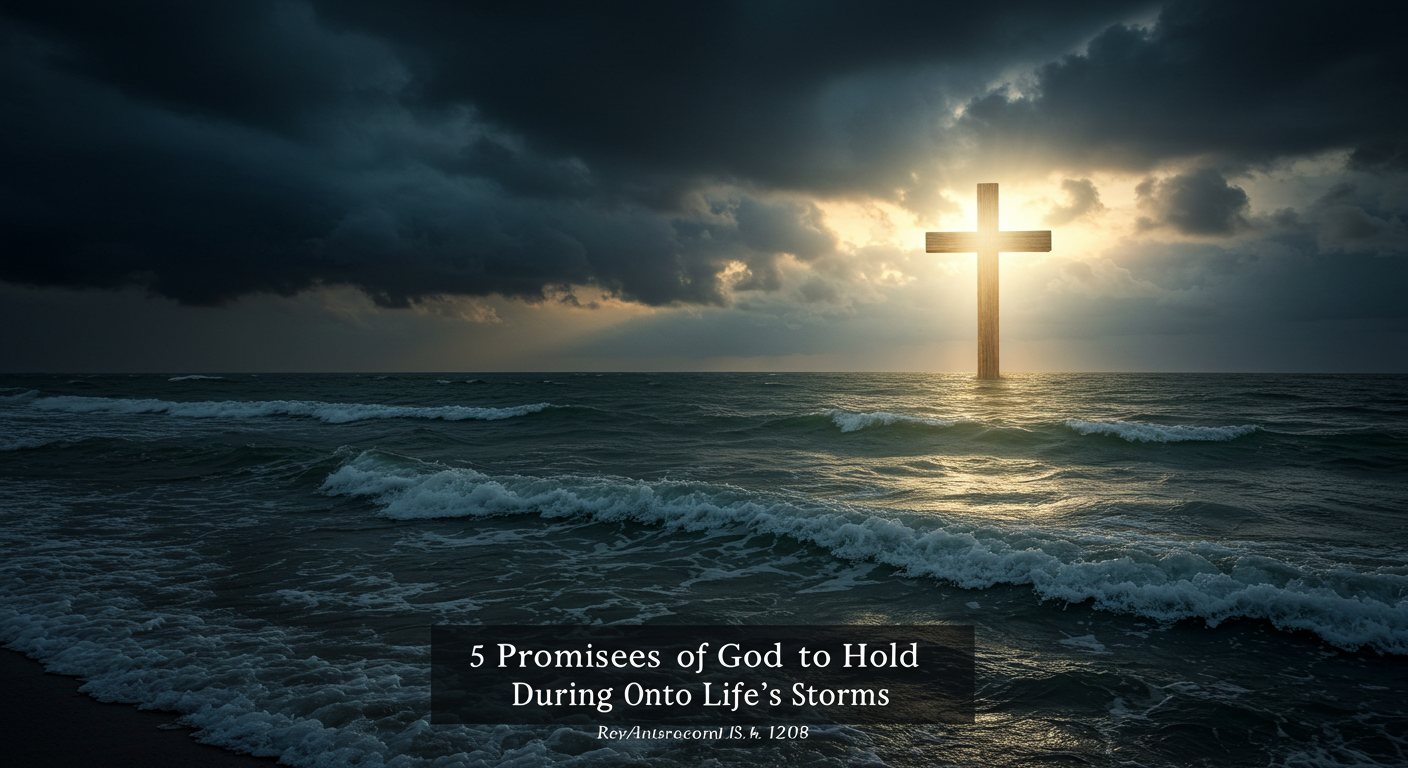5 Promises Of God To Hold Onto During Life’s Storms
Storms come to every life. You don’t get to choose the weather of your circumstances, but you do get to choose where you stand when the wind and rain come. When you’re in the middle of a trial — a job loss, a health crisis, grief, a broken relationship, or a season of anxiety — you need certain assurances to steady your heart. The Bible gives you promises to hold onto, anchors for your soul. These aren’t vague platitudes; they’re concrete assurances from the living God. If you’re looking for encouragement, this article will walk you through five promises of God to hold onto during life’s storms so you can face them with courage and faith.
In the paragraphs below, you’ll see Scripture, practical steps, and pastoral encouragement. Each promise is backed by a passage from the Bible, so you can go read it in context. You’ll discover that the promises of God in hard times aren’t just statements — they’re lifelines. When you learn to anchor yourself in these truths, you’ll find steadiness even as the storm rages.
The phrase promises of God in hard times should stir something in you: God has spoken into your storm. Keep reading; the Holy Spirit wants to remind you of what is true.
Promise 1 — God Is With You: His Presence Will Carry You
You are never alone in the storm. God’s presence is not a warm, fuzzy idea — it’s a promise you can stake your life on. When you feel abandoned, when every door seems closed, and the future looks uncertain, God says He is with you. That presence feels like a companion who will not desert you, who holds you through the shaking and the sorrow.
What the Bible says about God’s presence
The prophet offers a powerful comfort: Isaiah 43:2 promises that when you walk through deep waters or fire, God will be with you. Jesus echoed the enduring nature of that presence when He said, “I am with you always” in Matthew 28:20. These verses make clear that God’s nearness is not conditional on your performance or emotional state — it’s a commitment based on His character.
How God’s presence helps you in a storm
When you know God is with you, you can face hardships without being owned by them. Presence changes your posture. Instead of asking, “Why me?” you can ask, “What is God doing in me through this?” Presence does not always remove pain, but it transforms suffering into a place where grace can meet you. You’ll find strength to take the next step, clarity to make hard decisions, and peace to sleep on nights when worries would otherwise keep you awake.
Hold tightly to the promises of God in hard times by cultivating awareness of His presence: pray honestly, read Scripture, and remind yourself of His promises out loud. This is practical faith — taking God at His word and letting that word change how you live.
Promise 2 — God Gives You Peace That Surpasses Understanding
A storm can wreak havoc on your emotions. Your heart feels like a ship tossed on waves. But God offers a peace that doesn’t depend on circumstances. That peace steadies your mind and guards your heart even when explanations are out of reach.
What the Bible says about God’s peace
Jesus promised a peace different from what the world can give in John 14:27. The apostle Paul instructed believers to take their anxieties to God in prayer and promised that God’s peace would guard their hearts and minds in Philippians 4:6-7. These verses don’t minimize your feelings; they give you a way to move through anxiety into a supernatural calm.
How to receive and hold onto this peace
Receiving God’s peace is an act of faith. It happens when you turn worry into prayer, when you exchange anxious rumination for focused petition and thanksgiving. Practically, you can start by naming your fears to God, then thanking Him for a specific provision. That shifts your heart from fear to faith. Keep a journal of answered prayers and reminders of God’s past faithfulness; reading those notes during a storm will help you claim the promises of God in hard times and remember that His peace is available, no matter how chaotic things look.
When the waves are high, let your prayers be higher. Let God’s peace settle into your heart and keep your spirit steady.
Promise 3 — God Will Provide for Your Needs
One of the most pressing fears in a crisis is lack — will there be enough to get by? God’s promise of provision is not a guarantee of luxury, but it is an assurance that He will supply what you truly need. Provision may come through people, unexpected resources, or a new way of thinking, but it arrives because God cares for you.
What the Bible says about God’s provision
Jesus taught His followers not to be consumed by worry about food, clothing, or tomorrow, reminding them that God knows what they need and will provide in Matthew 6:25-34. The apostle Paul wrote to the Philippians: “And my God will meet all your needs according to the riches of his glory in Christ Jesus” in Philippians 4:19. These promises invite you to trust God with practical concerns, not as a passive exercise but as an active dependence expressed in prayer and wise stewardship.
How to trust God for provision in practical ways
Trusting God for provision involves both faith and action. Don’t interpret God’s promise as a reason for passivity. Apply for the job, look for community resources, cut unnecessary spending, and ask God for wisdom. At the same time, be open to God’s unexpected ways of providing: a neighbor’s help, a surprise check, or an opportunity you didn’t anticipate. Remember that God often works through people. When you pair practical steps with prayer, you participate in God’s provision.
Keep the promises of God in hard times in front of you when financial anxieties mount. Memorize Philippians 4:19 and rehearse how God has met needs before. This builds faith muscles that will carry you through future storms.
Promise 4 — God Gives Strength and Sustaining Grace
Exhaustion is a common feature of long, hard seasons. You may feel depleted emotionally, physically, and spiritually. The Bible promises not only strength but sustaining grace — the kind of strength that is present when your own reserves are gone.
What the Bible says about God’s strength and grace
Isaiah gives a vivid picture of renewed strength for those who hope in the Lord: “[They] will soar on wings like eagles; they will run and not grow weary” in Isaiah 40:31. Paul reported that God’s grace was sufficient for him even in weakness, explaining that Christ’s power is made perfect in weakness in 2 Corinthians 12:9-10. These verses teach a counterintuitive truth: your weakness can be the very place where God demonstrates His strength.
How to receive God’s strength in the middle of your storm
You receive God’s strength by admitting weakness and leaning on Him. That starts with honest prayer — telling God you are tired, asking for help, and yielding control. Spiritual disciplines like rest, Scripture reading, and regular communion with God create space for grace to flow. Practically, you also need to set boundaries and allow others to support you. Let God use people to amplify His strength in your life. When you’re honest about needing help, you open the door for grace to meet you in powerful ways.
Remind yourself daily that the promises of God in hard times include His sustaining strength. You won’t always feel strong, but you can hold steady because God’s power is active in your weakness.

Promise 5 — God Works All Things for Good and Gives Hope
When storms strip away comfort and certainty, you can cling to a promise that God is working a larger purpose even through the difficult chapters of your life. This promise does not mean every painful event is good in itself, but that God can weave hardship into a redemptive story.
What the Bible says about God’s purpose and hope
One of the most beloved assurances is found in Romans 8:28: “And we know that in all things God works for the good of those who love him, who have been called according to his purpose.” God also promises a future filled with hope in Jeremiah 29:11, where He declares plans for welfare and not for calamity, to give you a future and a hope. These are not generic motivational quotes — they’re promises you can rely on when you’re trying to make sense of suffering.
How to live in the tension of pain and purpose
Living in the tension between present pain and future purpose requires patience and spiritual discipline. It helps to reframe your story: instead of asking only “Why did this happen to me?” begin to ask “How will God use this in me and through me?” Suffering can produce endurance, character, and hope (see Romans 5:3-5); those are spiritual dividends you wouldn’t get without the testing. Continue to serve where you can, invest in relationships, and keep your eyes open for ways God may be working behind the scenes. Remember that God’s purposes are often revealed over time — sometimes long after the storm has passed.
Cling to the promises of God in hard times by cultivating hope: journal, pray for God’s perspective, and surround yourself with people who can remind you of what God has spoken.
Practical Steps to Anchor Yourself in These Promises
Promises are helpful, but you need practical steps to internalize them. Here are five things you can start doing today to hold onto God’s promises when storms hit.
- Pray with specificity: Name your fears and petition God for concrete help.
- Read and memorize Scripture: Keep the verses above close to your heart and mind.
- Connect with people: Share your struggles with trusted friends or a church family.
- Practice gratitude: Thank God for small provisions and past faithfulness — gratitude is a spiritual muscle that grows trust.
- Serve when you can: Helping others reorients your heart from constant self-focus to God’s bigger work.
Each of these actions helps you live out the promises of God in hard times. They’re not magic formulas, but they do open you to God’s presence, peace, provision, strength, and purpose.
Common Objections and Honest Answers
You might be thinking, “If God promises these things, why do bad things still happen?” That’s a fair and honest question. Promises from God don’t always mean the removal of difficulty. Instead, many promises mean God’s presence, power, and purpose will be with you through the difficulty. Sometimes He does change our circumstances; sometimes He changes us within the circumstances. Both outcomes are expressions of His love.
Another objection is: “What if I don’t feel any of these promises?” Emotions are not the ultimate gauge of reality. Feelings can lag behind truth. You may not feel comforted or confident, but you can act in faith: pray, read Scripture, and take small steps toward trusting God. Faith often chooses to believe before it feels believable.
If you’ve struggled with doubt, remember that doubt does not disqualify you from God’s promises. It invites you into honest conversation with Him. God meets honest hearts.
Stories of Hope: Real-Life Examples
There’s a practical, pastoral point in sharing stories: they make doctrine tangible. Imagine a single mother who lost her job and discovered neighbors who pooled groceries and a church that connected her with temporary work. Or a man whose cancer diagnosis led to deeper reconciliation with his estranged son — pain that yielded repaired relationships. Or a young woman who found unexpected peace in daily prayer during her season of anxiety and later testified that those prayers changed her perspective permanently.
These stories show how the promises of God in hard times often arrive through people, prayer, and a long view of God’s work. They remind you that you are part of a story larger than this moment.
How to Pray When You’re in the Storm
Prayer is the practical bridge between your fear and God’s promises. When you don’t know what to pray, pray the promises back to God. For example:
- “Lord, You said You are with me. Be with me now.” (Reflect on Isaiah 43:2)
- “Father, You promised peace. Guard my heart and mind as I bring this concern to You.” (Reflect on Philippians 4:6-7)
- “God, I need provision. Help me trust You for what I need.” (Reflect on Philippians 4:19)
- “Lord, I’m weak. Your grace is sufficient.” (Reflect on 2 Corinthians 12:9-10)
- “God, You promised to work all things for good. Help me see Your hand.” (Reflect on Romans 8:28)
Pray specific, brief prayers. Then be still for a moment and listen. Sometimes God answers with a next step; sometimes He answers with His presence. Both are answers.
How Your Church Community Can Help
You were not meant to face storms alone. The local church is God’s primary instrument for providing presence, practical help, accountability, and hope. Reach out to leaders, small groups, or care ministries. Let people pray for you, bring meals, help with childcare, or point you to resources.
If you’re not sure where to start, call the pastor, message a friend, or attend a prayer group. You’ll be surprised how many people want to help but don’t know you need help until you tell them. In the community, you experience the promises of God in hard times through tangible love and service.
When the Storm Doesn’t End Quickly
Sometimes storms last longer than you hoped. You may have to wait, and waiting is sometimes the hardest spiritual discipline. But long seasons also produce deep growth. In long storms, your faith can become less about immediate relief and more about saying “Lord, I trust You” day after day. Practice the little disciplines that build endurance: keep worshiping, keep praying, keep giving, keep serving, and keep reading Scripture.
Long storms test you, but they also refine you. They teach dependence and character that short storms can’t. Remember that God’s promise to work all things for good (Romans 8:28) applies over time, not just in an instant.

Final Encouragement
When you hold firmly to these five promises — God’s presence, peace, provision, strength, and purpose — you’ll find that storms no longer define you. They shape you, refine you, and, with God’s help, can even become a springboard for deepened faith and service. Never minimize the importance of community, prayer, and Scripture as you live out these promises. The promises of God in hard times are not theoretical; they are meant to be lived.
Keep returning to the Bible passages we’ve discussed. Read them aloud. Memorize them. Let them be your anchors. As Pastor Rick Warren often says in his pastoral tone: don’t just think about your problems — take steps of faith, however small, and trust God to meet you in the midst of them.
Explore More
For further reading and encouragement, check out these posts:
👉 7 Bible Verses About Faith in Hard Times
👉 Job’s Faith: What We Can Learn From His Trials
👉 How To Trust God When Everything Falls Apart
👉 Why God Allows Suffering – A Biblical Perspective
👉 Faith Over Fear: How To Stand Strong In Uncertain Seasons
👉 How To Encourage Someone Struggling With Their Faith
👉 5 Prayers for Strength When You’re Feeling Weak

📘 Jesus and the Woman Caught in Adultery – Grace and Mercy Over Judgement
A powerful retelling of John 8:1-11. This book brings to life the depth of forgiveness, mercy, and God’s unwavering love.
👉 Check it now on Amazon
As a ClickBank Affiliate, I earn from qualifying purchases.
Acknowledgment: All Bible verses referenced in this article were accessed via Bible Gateway (or Bible Hub).
“Want to explore more? Check out our latest post on Why Jesus? and discover the life-changing truth of the Gospel!”








